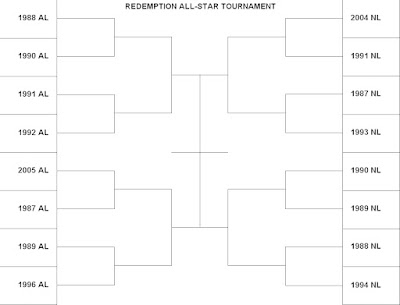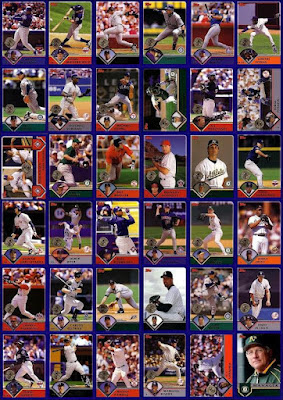 |
| The 1997 AL All-Star Team vs. The 2008 AL All-Star Team |
The second AL Eastern Conference Round 1 match pitted the second seed 1997 AL All-Star Team against the 3rd seed 2008 AL All-Star Team. To review, here are how the pitching match-ups and lineups were determined:
- The pitching rotations were set based on the All-Star Series results posted on bdj610's Topps Baseball Card Blog (you can click on each of the links on the sidebar to see each year's match-ups).
- The lineups for the first six series were set, with each position player in the starting lineup twice.
- The seventh series was done in an anything goes format, where the lineups were randomly determined, spot starters were used (SBS only allows up to five names for the rotation).
- The series was not run in a best-of-seven (first to four wins). All seven series are run regardless of the outcome.
The 1997 AL All-Stars finished second in their division with a 91-71 record. The 2008 AL All-Stars finished third with a 75-87 record. The 1997 AL All-Stars took the season series against the 2008 AL All-Stars 10-8.
For the tournament, each series consists of 10,000 simulated games. The winner of each series = the winner of a game. Here are the results from the seven series simulations:
- Game 1: 2008 AL vs. 1997 AL, Cliff Lee (08) vs. Roger Clemens (97). The 97 AL team wins 6,217 games out of 10,000 simulations.
- Game 2: 2008 AL vs. 1997 AL, Roy Halladay (08) vs. Brad Radke (97). The 97 AL team wins 5,004 games. The 2008 AL team had the lead most of the series, but the 97 AL team overtook them in the final 500 games.
- Game 3: 1997 AL vs. 2008 AL, Andy Pettitte (97) vs. Daisuke Matsuzaka (08). The 97 AL team wins 5,942 games.
- Game 4: 1997 AL vs. 2008 AL, Randy Johnson (97) vs. Gavin Floyd (08). The 97 AL team wins 7,015 games.
- Game 5: 1997 AL vs. 2008 AL, Jamie Moyer (97) vs. Joe Saunders (08). The 97 AL team wins 5,412 games.
- Game 6: 2008 AL vs. 1997 AL, A. J. Burnett (08) vs. Pat Hentgen (93). The 97 AL team wins 5,728 games.
- Game 7: 2008 AL vs. 1997 AL, anything goes. The 1997 AL team wins 6,103 games.
The 1997 AL All-Star Team advances to the second round thanks to a 7-0 series sweep. They will face the 1999 AL All-Star Team in the second round in a (1) vs. (2) seed match-up.
Sincerely,
JayBee Anama


















